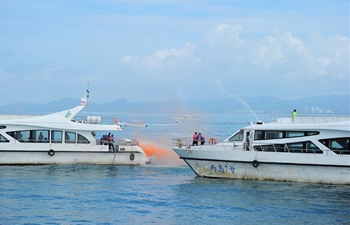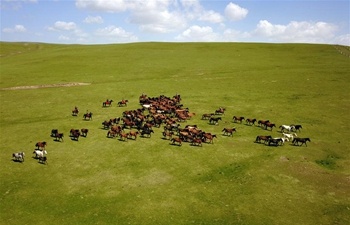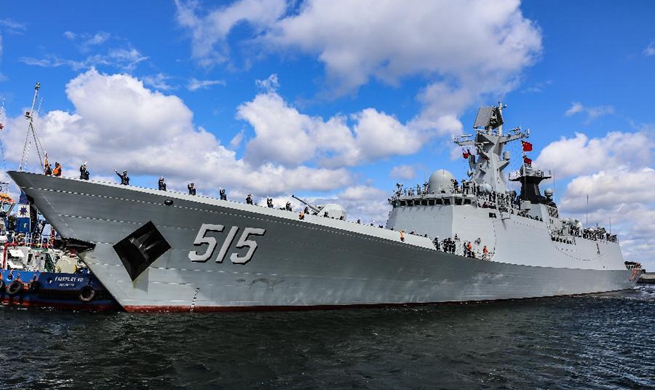by Murad Abdu
ADEN, Yemen, June 23 (Xinhua) -- Armed confrontations between the Yemeni government forces and the Iran-backed Shiite Houthi group have forced thousands of people to flee their homes in the strategic port city of Hodeidah amid lack of basic necessities including food, clothing and water.
The Yemeni troops, backed by the United Arab Emirates, managed to seize full control of the city's sole international airport following ferocious fighting, and began preparations for a new offensive to retake the Houthi-controlled seaport.
Meanwhile, the Houthi rebels withdrew and established fortifications inside residential areas, in addition to digging up underground trenches and barricading roads leading to the city center with cement to confront the advancing government forces.
Both Yemeni government officials and local relief agencies have sounded the alarm over a looming humanitarian crisis as armed confrontations intensified.
Last week, residents sent an emergency appeal to humanitarian agencies for scaling up aid to displaced people, especially those who are taking shelter in camps without basic living conditions.
A number of families arrived in the southern port city of Aden and neighboring provinces after mortar shells and airstrikes by Saudi-led warplanes randomly targeted their residential areas in Hodeidah.
Amin Saleh, a father of five, spent several days in Aden waiting for humanitarian agencies to support his family after he left everything including his properties behind in Hodeidah.
"I arrived here with my children, but am in a pressing need for support from local organizations. I fled home with empty hands and am living with my relatives temporarily," Amin told Xinhua.
"Everything is expensive here and I paid all my money for the transport cost from Hodeidah to here," he said.
Without monthly salaries to depend on, the majority of people in Hodeidah used to struggle with physical work like fishing to gain money and buy essentials for their families.
However, severe restrictions on sailing, airstrikes by the Saudi-led coalition and hundreds of improvised sea mines deployed by Houthi fighters, have deprived residents of Hodeidah of fishing, aggravating the suffering of the already poor people.
Nader Murshdi was one of the many fishermen who lost their jobs as a result of the raging armed confrontations over the control of Hodeidah.
The man, in his 40s, arrived in Aden, where he started looking for jobs with local companies specialized in fishing activities.
"I spent my life in fishing but unfortunately the war that touched my beloved city devastated everything and affected me badly. I left my home and moved my family to live in rural areas," Murshdi said.
"Now I'm alone in Aden and trying hard to find work in the field of fishing only because I have enough experience and it's my favorite job," he added.
Other refugees who are sheltering in temporary camps outside of Aden also whined about their hardships in the war-torn country.
Um Ayad, a mother of two, said lack of cooking gas forced her to go looking for firewood near the camps in the early morning in order to prepare meals for her children.
"Gathering firewood is an exhausting task but it is very essential to prepare daily meals and save my children away from hunger," she said.
Ayad urged local charities to provide displaced people with tents, medical care and adequate clean water for drinking.
Local humanitarian officials told Xinhua that the number of internally displaced people increased during the past days and urgent solutions are needed to deal with the critical humanitarian condition in camps.
"International organizations have to double their assessment because everyday we receive displaced people who need shelters and food," said Bushra Asim, a female humanitarian worker based in southern Yemen.
Lise Grande, the humanitarian coordinator in Yemen, said in a press statement that hundreds of thousands of civilians in Hodeidah are at grave risk.
"We are deeply worried about the situation. Even before the fighting began, conditions in Hodeidah were some of the worst in the country," Lise said.
About 25 percent of children in Hodeidah are suffering from acute malnutrition, and if nutritional support from humanitarian agencies is disrupted, it will risk the lives of almost 100,000 children.
Hodeidah was one of the epicenters of last year's cholera outbreak in Yemen, one of the worst in modern history, Lise said.
However, the Saudi-backed Yemeni government regarded retaking Hodeidah and its seaport as a milestone on the path of "liberating" the country from the grip of the Houthis aligned with Iran.
The Houthis, after being pushed out of Hodeidah's airport, are now using residential neighborhoods to hide their tanks and civilians as human shields in violation of international humanitarian law, according to a statement issued by the Yemeni government.
The government said liberating Hodeidah will result in the speedy alleviation of suffering of all Yemenis, including the residents in Hodeidah.
Strategically situated on the Red Sea coast, Hodeidah, Yemen's fourth largest city with a population of 600,000, is the only major port city under Houthi control.
The Hodeidah port, captured by the Iran-backed Houthis in October 2014, serves as a key source of strength for Houthi militias because it is regarded as a lifeline for many Yemenis.
The United Nations warned that the battles to liberate Hodeidah, which has the highest poverty and malnutrition rates in war-torn Yemen, could lead to the death of 250,000 people.

















